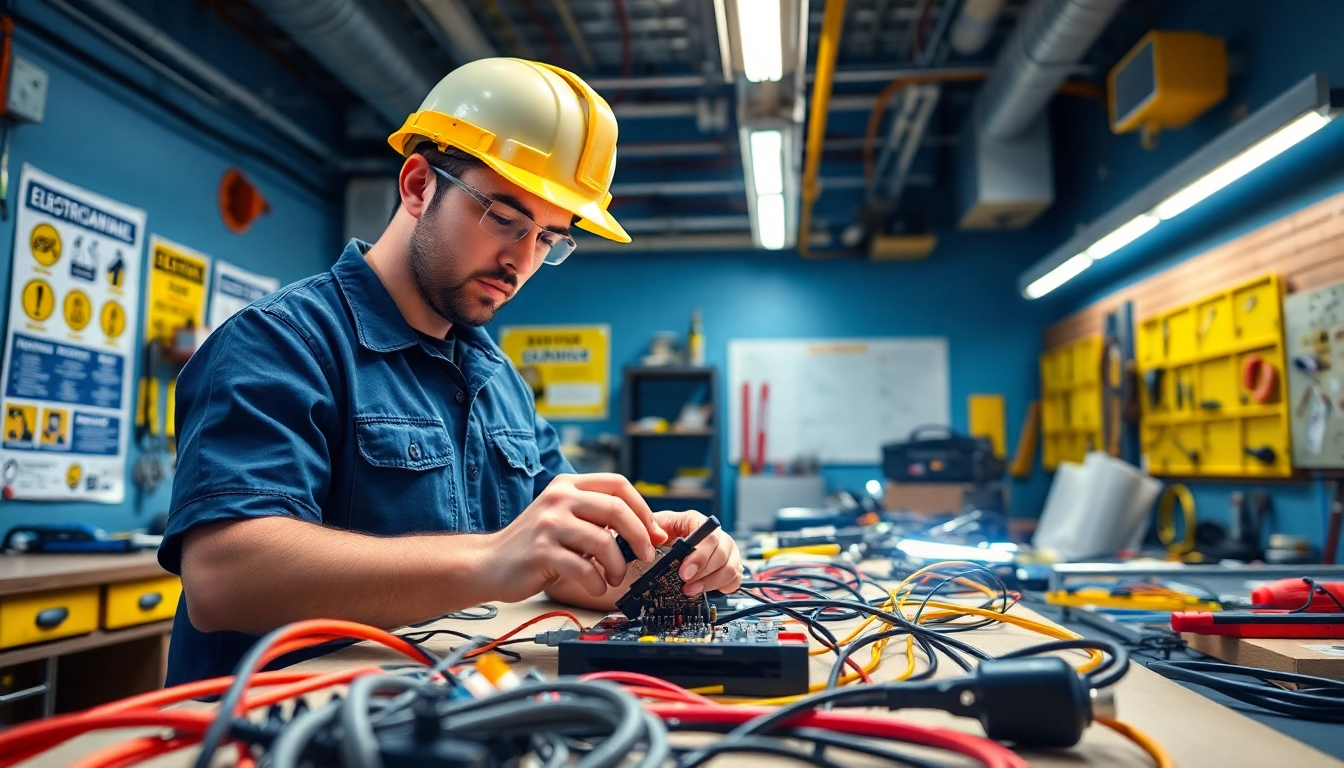
Understanding Electrician Apprenticeship Hawaii
What is an Electrician Apprenticeship?
An electrician apprenticeship is a structured training program that combines hands-on experience with classroom instruction, designed to provide individuals with the skills necessary to work as professional electricians. In Hawaii, these programs are crucial for those looking to enter the electrical trade, offering a pathway to becoming licensed electricians. Apprentices learn from experienced professionals in the field while also studying electrical theory, safety practices, and local regulations.
Importance of Apprenticeships in the Electrical Trade
Apprenticeships in the electrical trade hold immense importance for several reasons. Firstly, they ensure that new electricians are well-equipped with the necessary skills and knowledge, which is vital for safety and efficiency in electrical installations and repairs. Furthermore, these programs create a robust pipeline of qualified electricians, helping to meet the demand for skilled labor in Hawaii’s growing construction and utilities sectors.
In addition to technical skills, apprenticeships also instill professional values and work ethics, making graduates well-rounded members of the workforce. The mentorship aspect of apprenticeships fosters not only technical knowledge but also soft skills, such as communication and teamwork, which are essential in today’s job market.
Requirements for Starting an Electrician Apprenticeship Hawaii
To start an electrician apprenticeship in Hawaii, candidates must meet several basic requirements. Generally, applicants should be at least 18 years old, possess a high school diploma or GED, and demonstrate a fundamental understanding of math and electrical theory. Additionally, prospective apprentices are often required to pass an aptitude test, which evaluates their suitability for the program.
Before applying, it is also advisable for candidates to have some basic experience or training in related fields, such as construction or technical programs, as this can significantly enhance their applications. Interested individuals can find more information about apprenticeship opportunities by exploring resources provided by local training organizations. For more details, check out electrician apprenticeship hawaii.
Navigating the Application Process
Steps to Apply for Electrician Apprenticeship Programs
The application process for electrician apprenticeships typically involves several key steps:
- Research Programs: Identify accredited apprenticeship programs in Hawaii that align with your career goals.
- Meet Eligibility Requirements: Ensure that you meet the necessary age, education, and aptitude test requirements.
- Complete an Application: Fill out an application form, providing accurate information about your education and any relevant experience.
- Attend an Interview: Be prepared to discuss your interest in the electrical trade and your long-term career aspirations in an interview setting.
- Pass an Aptitude Test: Successfully complete any required aptitude tests to assess your suitability for the program.
- Begin Training: Once accepted, you will start your apprenticeship program, which combines practical training with classroom instruction.
Common Challenges in the Application Process
While navigating the application process, candidates may face several challenges. One common issue is the intense competition for apprenticeship spots. As many individuals seek to enter the electrical field, applicants often find themselves competing against a large pool of candidates. To stand out, it’s crucial to showcase any relevant skills or experiences in your application.
Another challenge can be the aptitude test, particularly for those who may not have a strong math background. To overcome this hurdle, candidates can benefit from preparatory courses or practice tests, focusing on electrical concepts and math skills relevant to the trade.
Preparing for the Aptitude Test
Effective preparation for the aptitude test can significantly influence your success rate. Here are some strategies:
- Study Relevant Materials: Familiarize yourself with fundamental electrical concepts and mathematical calculations commonly used in electrical work.
- Practice Sample Tests: Access online resources or local study groups that offer sample questions similar to what you might face in the actual test.
- Focus on Weak Areas: Identify and concentrate on any specific areas of weakness, ensuring a well-rounded preparation.
Training and Education in Electrician Apprenticeship Hawaii
Curriculum Overview for Electrician Apprentices
The curriculum for electrician apprenticeships in Hawaii typically encompasses a wide variety of topics essential for electrical work. Core subjects often include:
- Electrical theory and principles
- Safety protocols and regulations
- Blueprint reading and interpretation
- Wiring methods and techniques
- Installation of electrical systems
- Understanding of local and national electrical codes
This comprehensive curriculum ensures that apprentices gain both theoretical knowledge and practical skills during their training.
Hands-On Training Opportunities
Hands-on training is a critical component of electrician apprenticeships, allowing trainees to apply their classroom knowledge in real-world scenarios. Apprentices often work alongside licensed electricians on various projects, enabling them to gain valuable experience in:
- Residential and commercial electrical installations
- Repairs and troubleshooting
- Maintenance of electrical systems
- Adhering to safety standards and practices on job sites
This practical exposure not only enhances technical skills but also nurtures confidence and independence in undertaking electrical tasks.
Certification and Licensing Requirements
Upon completion of an apprenticeship program, graduates are eligible to take the licensing exam for electricians in Hawaii. To obtain a license, candidates must demonstrate their knowledge by passing this exam, which tests their understanding of electrical codes, safety practices, and practical applications. Licensing not only allows electricians to work independently but also enhances their credibility in the industry, making them more attractive to potential employers.
Career Prospects and Opportunities
Potential Career Paths After Completing an Apprenticeship
Graduates of electrician apprenticeships in Hawaii have a wealth of career opportunities available to them. Some common paths include:
- Residential Electrician: Specializing in electrical installations and repairs within homes.
- Commercial Electrician: Focusing on electrical work in business premises and commercial buildings.
- Industrial Electrician: Working in manufacturing or production facilities, handling complex electrical systems.
- Master Electrician: Obtaining advanced certification to supervise and train other electricians.
Each of these paths comes with its unique challenges and rewards, offering opportunities for specialization and growth.
Average Salary and Job Outlook in Hawaii
The demand for skilled electricians in Hawaii remains robust, thanks in part to ongoing construction projects and the need for electrical upgrades in aging infrastructure. According to labor statistics, electricians in Hawaii can expect competitive salaries, often exceeding the national average for the trade. Additionally, with the growth of renewable energy initiatives, electric vehicles, and smart technology, the job outlook for electricians is particularly positive.
Networking and Professional Development for Electricians
Networking is essential for career advancement in the electrical field. Joining professional associations and attending industry events can significantly enhance an electrician’s career. Engaging with fellow professionals helps build connections, share knowledge, and open doors to job opportunities. Furthermore, ongoing education is vital to stay updated with the latest technologies, techniques, and codes in the industry.
Success Stories from Electrician Apprenticeship Hawaii
Alumni Experiences and Testimonials
Many successful electricians in Hawaii attribute their achievements to the foundational training they received during their apprenticeships. Alumni often reflect on their journeys, emphasizing the importance of mentorship and hands-on learning. These experiences serve as powerful testimonials, inspiring the next generation of electricians to pursue their dreams in the trade.
Lessons Learned During Apprenticeship
Throughout the apprenticeship process, many individuals learn invaluable lessons that extend beyond technical skills. Key takeaways often include:
- The importance of safety and adherence to regulations.
- Effective communication and teamwork skills.
- Problem-solving techniques in high-pressure situations.
These lessons prepare apprentices not just for specific jobs but for a successful career overall.
How Apprenticeships Shape Future Electricians’ Careers
Electrician apprenticeships play a pivotal role in shaping the careers of future electricians. By providing comprehensive training and fostering a strong work ethic, apprenticeships create a pathway for success. Graduates stand out as highly skilled candidates in a competitive job market, equipped not only with technical knowledge but also with the confidence to tackle the challenges of the electrical profession.







